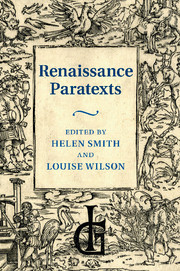Book contents
- Frontmatter
- Contents
- Figures
- Contributors
- Acknowledgements
- Introduction
- Part I Orders of the book
- Chapter 1 ‘Imprinted by Simeon such a signe’: reading early modern imprints
- Chapter 2 ‘Intended to Offenders’: the running titles of early modern books
- Chapter 3 Changed opinion as to flowers
- Chapter 4 The beginning of ‘The End’: terminal paratext and the birth of print culture
- Part II Making readers
- Part III Books and users
- Notes
- Select bibliography
- Index
Chapter 2 - ‘Intended to Offenders’: the running titles of early modern books
Published online by Cambridge University Press: 05 August 2011
- Frontmatter
- Contents
- Figures
- Contributors
- Acknowledgements
- Introduction
- Part I Orders of the book
- Chapter 1 ‘Imprinted by Simeon such a signe’: reading early modern imprints
- Chapter 2 ‘Intended to Offenders’: the running titles of early modern books
- Chapter 3 Changed opinion as to flowers
- Chapter 4 The beginning of ‘The End’: terminal paratext and the birth of print culture
- Part II Making readers
- Part III Books and users
- Notes
- Select bibliography
- Index
Summary
Page 340 of the second volume of A Short-Title Catalogue of Books Printed in England, Scotland, & Ireland and of English Books Printed Abroad, 1475–1640 contains an error. In such a complex and indispensable work it might seem churlish to highlight this minor weakness apart from the fact that, as David McKitterick has pointed out, this ‘slip’ is no mere act of carelessness. At the head of the seventh out of nine columns for the works of the prolific and popular late Elizabethan/early Stuart minister, Henry Smith, Katherine Panzer (one of the work’s main compilers) offered an insight into her view of this prolix pastor. Perhaps exasperated by the 161 separate and complicated STC entries required for his oft-reprinted, sometimes pirated and certainly prodigious output, Panzer replaced the normal ‘running head’, as McKitterick terms it, of ‘Smith, Henry, Minister – Collections – cont.’ with the mischievous ‘Smith, Henry, Monster – Collections – cont.’ As well as disclosing her sense of humour, Panzer’s amendment points towards the use of the paratext for interpretative purposes. It moves away from a means of categorising Smith by his profession (‘minister’: itself an interpretative action) and towards what might be understood as a comment (‘monster’) on the intricacies of his entry in STC. The switch exemplifies Gérard Genette’s observation that the threshold of a text can mediate it to the reader.
- Type
- Chapter
- Information
- Renaissance Paratexts , pp. 34 - 47Publisher: Cambridge University PressPrint publication year: 2011
- 2
- Cited by

